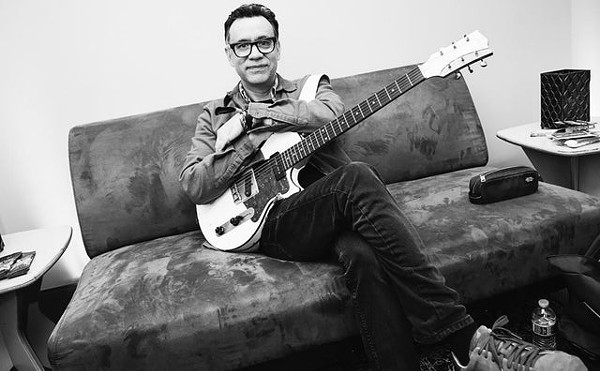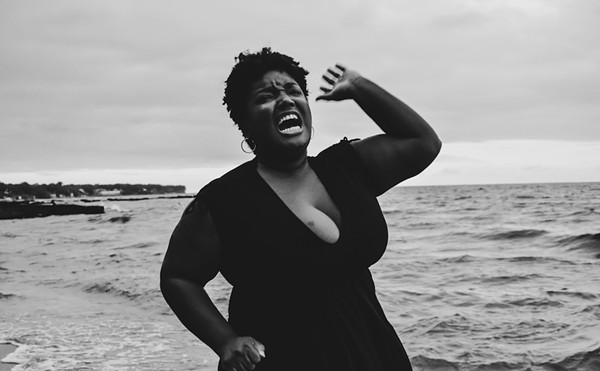Denne Michele Norris on Writing, Cleveland, and Elevating Black Trans Voices
Norris is the first Black, openly trans woman to helm a major literary publication
By Literary Cleveland on Wed, Sep 7, 2022 at 10:45 am
[
{
"name": "Ad - NativeInline - Injected",
"component": "38482495",
"insertPoint": "3",
"requiredCountToDisplay": "5"
},{
"name": "Real 1 Player (r2) - Inline",
"component": "38482494",
"insertPoint": "2/3",
"requiredCountToDisplay": "9"
}
]
African-American literature is not only a living archive of history and heritage, it is a futurist technology that forges new frontiers of identity, liberty, community, and creativity. The Great Lakes African American Writers Conference (GLAAWC) is a yearly celebration of the awesome depth and breadth of Black literature—its past, present, and future—infinite modalities, utilities, and possibilities.
This year, in recognition of African American writers’ ability to celebrate, educate, and innovate, GLAAWC has named Denne Michele Norris the 2022 Alice Dunbar Nelson Professional Keynote Speaker. As editor-in-chief of Electric Literature, Denne Michele is the first Black, openly trans woman to helm a major literary publication.
Norris’s fiction, which appears in the anthologies Everyday People: The Color of Life (Atria Books) and Forward: 21st Century Flash Fiction, has been nominated twice for a Pushcart Prize, and her story “Where Every Boy Is Known and Loved” was a finalist for the 2018 Best Small Fictions Prize. She is a 2021 Out100 Honoree, 2019 Peter Taylor Fellow at The Kenyon Review Fiction Workshop, and co-host of the critically acclaimed podcast Food 4 Thot.
In a recent exchange with GLAAWC Founder and Executive Producer Rev. Dr. Leah C.K. Lewis, Norris spoke candidly about her hometown connection to Cleveland, reasons for writing, and achievements and aspirations as an editor. GLAAWC attendees can enjoy Norris’s keynote virtually or in person at the Louis Stokes Wing Main Auditorium of the CPL Main Branch on Saturday, September 17.
When did you know you wanted to become a writer? An editor?
I’ve been writing creatively since I was in middle school. I wrote my first novel in one of those now vintage Mead college ruled notebooks when I was 12. I’ve been writing ever since, but it was when I handed in my undergraduate thesis that I realized I was more proud of my writing than anything else I’d ever done. I decided that summer to give it a go and gave myself a deadline to have something—anything—published within 5 years—or I was going to law school. I published my first short story at 4 years and 8 months!
I realized I was a strong editor in graduate school, and a few years later, a friend from grad school approached me about taking over the role of Fiction Editor at a wonderful literary journal, Apogee Journal, and I jumped at the opportunity. And I haven’t stopped since.
How did life in Cleveland inspire your art? How did it inform your craft?
Much of my fiction is set vaguely in the Midwest, but a lot of the novel I’m working on is actually set in Chagrin Falls. Place really informs both setting and character, so I find that life in Cleveland helps me think through all things character: motivation, tension, opinions and behaviors and choices—as well as the visuals I hope a reader conjures when they read my work. It also deeply impacts the sound of my characters, the sound of a setting—in as much as dialogue is crafted to reflect setting. Largely speaking, Cleveland has influenced my writing in the details—the characteristics that make fiction real to a reader.
What role has being trans played in your compulsion—if I may call it that—to write?
I think the biggest role that being trans has played in my compulsion to write is in helping to shape the subject matter I write about. From centering queer and trans characters of color to writing critically about the systemic challenges we face, it’s at the core why I’m driven to write, as well as how I approach the publishing industry from an editor’s perspective.
There are so many large cultural conversations about trans people and identity writ large. But so often, the loudest voices talking about trans people aren’t trans people—and that’s a problem. I’m blessed enough to be in a position to do something about it, and that’s a huge part of my motivation, both as a writer, and as an editor.
Your identity exists in the intersection of so many different groups, all of which are considered “oppressed.” Has publishing and gaining recognition as a writer been harder for you as a Black trans woman? How have you overcome obstacles put in your path, and how would you encourage other writers, be they Black, LGBTQI+, women, what have you, to keep pushing?
It’s difficult for me to speak on whether or not it’s been more challenging for me to gain recognition because I’m a Black trans woman. I’m not in charge of what recognition I do or don’t receive. I don’t make those decisions. My honest feeling is that I started receiving recognition when my work was strong enough to earn it. I’ve always been almost single-mindedly focused on the work, the craft of what I’m doing. Not for some self-satisfied, high-minded reason, but for pragmatic reasons. I’m not in control of how my work will be received—that has very little to do with the writer beyond what they do on the page. A writer can promote their work until the cows come home, but it doesn’t mean readers will like it or even read it. What I can control is the effort I put forth. I can control whether or not I’ve earned the time and energy it takes to read my writing. I focus my energy on the things I can, at least, influence, if not entirely control.
Systematically speaking, it’s incredibly difficult for QPOC, especially Black trans people, to gain a sturdy foothold in this industry, and that is largely because the majority of decision makers are cishet white people. That’s just a fact. I encourage writers to focus on the primacy of craft. When you really know the craft of your artform, no one can take that away from your work. It’s undeniable. There are many aspiring writers out there—there are not always many exceptional ones. I also encourage writers, once they feel they have a steady handle on craft, to adopt a Shonda Rhimes “Year of Yes” mentality. But not for one year—do it for five. Do everything you can to meet people, talented, hard working people with integrity. Support them in their literary efforts. Invest in their success. They will likely do the same for you, and then you’ll have community—and that’s crucial.
Your first novel features a protagonist whose father dies, plunging him into a deep identity crisis. On the podcast Ideas on Fire, you say the book deals with “...shame, homophobia, race, interracial relationships…, questions of masculinity and femininity…, religion and faith.” What are some of the important things you seek to say about these things through your writing? What do you want readers to understand or realize through the experience of your work?
I certainly hope that readers will fall in love with these characters, but probably my biggest hope is that readers will come away from this book understanding that we can free ourselves from these shackles. We have constructed our society along certain lines, by human design. That is such a gift. It means that we can reimagine a better version at any time, and we can set out to make that better version a reality. And by the way, that’s the (much simplified) story of America. Let’s reimagine gender, let’s reimagine faith, let’s reimagine our rules on what everyone should or shouldn’t be.
How can the African American writing community elevate trans voices? Who are some of the trans writers out there right now that you want to shine a light on and help bring to a wider audience?
I think we can start by not caping for Black folks who spout transphobic rhetoric. People’s identities are not discussion points, and we have a habit of engaging with some serious both-sidesism when discussing transness, which inherently degrades the integrity of trans lives. I think this tendency comes from our own very gendered trauma in the context of the cishet white patriarchy that is America, but we must not allow that framework to justify us oppressing our own people, or delegitimizing the many and varied identities of Black people.
There are many Black trans activists that the community should be reading and elevating right now, like Raquel Willis and Janet Mock. There are also the poets Danez Smith and Rickey Laurentiis who’ve been consistently doing beautiful work for several years. Akwaeke Emezi is a wonderful writer, too.
If someone were to begin reading your work today, what should they pick up to get a meaningful sense of who you are as a writer and the project of your writing? What is your favorite published thing you’ve ever written? What are you working on now?
My story “Daddy’s Boy” is an early project of mine, published in 2016, that, while short, exemplifies so much of what occupies my literary imagination. There’s also an anthology celebrating short stories by writers of color, Everyday People: The Color of Life, that includes an excerpt of my novel, entitled “Last Rites.” I’m still working on that novel, and I’m starting the next novel and working on a number of short stories.
Tell us about Electric Lit. What does it contribute to the literary world that is unique and important?
Electric Lit is an independent digital publisher of short work with a mission to make literature more exciting, relevant, and inclusive since 2009. We publish two acclaimed literary magazines: Recommended Reading, for longer-form short fiction, and The Commuter, for poetry, graphic narrative, and flash prose. Outside of those, we also publish essays, book lists, and author interviews. As EL’s third editor-in-chief, I oversee the editorial operations of everything other than Recommended Reading and The Commuter. All of our work is available online for free, and every year we serve over 5 million readers. We’re often the first to publish or very early champions of new and emerging voices who become crucial to the American publishing landscape.
Was it important for you to become an editor? What do you consider your job as an editor?
I love connecting with authors and working together to affirm their vision—and sometimes grow it—of their work. The thing that becoming a full-time editor has done is that it’s given me a whole new level of regard for my work as an editor. Until I started working at EL—although I genuinely loved editing—I saw it primarily as something that would serve my ambitions as a writer. It’s so much more important to me now—my ambitions as an editor and my ambitions for my writing are, of course, intertwined, but they’re also very separate. Editing—and what I hope to accomplish as an editor—is just as important to me, if not more important, than whatever happens to my own writing. And I never knew I could feel that way about something.
What are some things you can tell writers about getting published as an experienced editor?
Listen closely to editors—take their advice when it’s right, but don’t be afraid to go a different way when it’s wrong. The editor doesn’t always have the answers, and that is not the editor’s job. Lastly, getting published is a wonderful thing for many reasons. It is not the be-all-end-all of a life in letters. Whether you are published or not, the task becomes more and more simple, I think, as you move forward. The task is to continue writing, continue reading. Keep traversing this road we’ve chosen, even if you can’t see very far in front of you. As my mother would say, that’s the time to step out on faith. Living life as a writer, ultimately, is about stepping out on faith.
It has been said that “It’s lonely at the top.” Is that the case for you as the highest-ranking Black trans woman in publishing today?
Yes. But I’m working hard to change it.
Tags:
SCENE Supporters make it possible to tell the Cleveland stories you won’t find elsewhere.
Become a supporter today.
Scroll to read more Arts Stories & Interviews articles
Newsletters
Join Cleveland Scene Newsletters
Subscribe now to get the latest news delivered right to your inbox.











